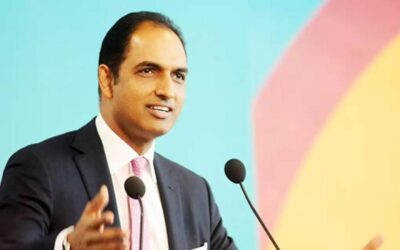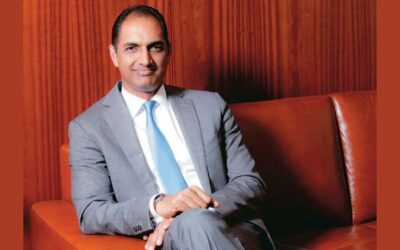” The potential of the youth of our country is yet to rise to its optimum capabilities provided through education and opportunities. Skill- building is greatly lagging.” says GV Sanjay Reddy highlighting the Indian Youth’s need to be trained in modern-day skills
The big, dynamic Indian youth population brings an excellent advantage in making our country one of the youngest nations currently in the world. With over 62% of the population in the 15-59 working age group and more than 54% below the age of 25, studies show how the average age of population in India is just 29 years as of 2020. Comparing this around the world, the average in USA is 40, in Europe, it is 46 while in Japan it stands at 47. It is evident that we enjoy an edge over the demographic dividend, with a robust, large and energetic group of rising innovators and creators to shape the course of destiny for our country. In a country that is rapidly expanding the momentum for education and schooling, a knowledge society with educated youth stands in a pivotal role for upliftment of the country. Yet, when one sees the on-ground reality, the working age group struggles each day with poverty, unemployment and manifold other issues, with little direction to advancement or achievement.
The problems around unemployment rose rapidly around the Corona Virus pandemic when the nation recorded a rise in the unemployment rate to 7.11% as of 2020, while during the previous years it did not cross the 5% mark. To add to the concerns, our country had been already battling with skill-gaps as one major drawback it had, considering other world countries. GV Sanjay Reddy throws light on the grim state as “India ranks second amongst the countries facing the highest skill shortages with a concerning 64%, right after Japan. It is clear that the youth potential of the country has not been tapped to its optimum capabilities despite being provided with education and opportunities. Skill-building and development are greatly at a lag.”
Statistics reveal how 53% percent of Indian businesses were unable to hire candidates in year 2019 owing to the lack of future skills in the candidates. Two years down the line, the pandemic has altered the work ecosystem with the introduction of remote productivity as the new order. This new normal has however revealed how the skill gaps that plagued the Indian job market have been amplified in scale with the coming of Covid. The world order is shifting from being a close-knit connumeration in coexistence to focusing more on localization over globalization now. As people are increasingly making the best of what’s available around, companies and businesses have unanimously harboured responsibility in innovation, better solution building – shifting from being consumers of resources to producers.
India needs technological solutions more than ever before now; the country’s best strength lies in the hands of the working age group who can employ knowledge and skills to make way out of the Covid Crisis. GV Sanjay Reddy, Vice Chairman of GVK highlights, “The rise in demand for technological skills like AI, ML, Data analytics etc has led to a shortage of skilled workforce proficient in the IT domain. While on one hand Indians are good in areas like ML and mathematics, on the other hand data skills are in great shortage in the country.” A survey by Coursera validates his points with data on how in year 2020 more than 5.7 million people had joined their platform while still, India continues to experience the greatest ordeals with digital skills gap. What further magnifies the skill-gaps today is how companies have to push investments in not just technology and tools but to also re-skill its existent workforce – teaching them the use of these devices.
In comparison to prosperous nation-states like Korea where 96% of the workforce has access to training at work, Japan is at 80% while Germany is at 75%, our nation records only a pitiable 10% of workforce who receive skill-building training at work. While talent pool generation is top of the list in corporations’ key agendas for achieving excellence, not many invest in the same. For companies, GV Sanjay Reddy remarks, “In the dynamic culture today, the shelf life of skills is shrinking as new innovations constantly make way. In the same time, the competition for talent is becoming neck-to-neck as hiring managers closely monitor both soft and hard skills before hiring candidates.” Career building in modern workplaces thus have a pre-requisite of new age skills – “the best fit” for their existent talent pool gets the job.
Backed by the crisis of Covid, in January of 2020, the World Economic Forum made an announcement of how there is a dire upskilling emergency for the world now – with about one billion people needing upskilling by year 2030. The message underpinning the announcement was for organisations, governments and the society to work together in bring in a skill- building environment to train people to find roles in the workplaces of tomorrow.
Talking about the demand and supply curve for hired-hands post the pandemic, GV Sanjay Reddy exclaims how, “An average employee in our country will need to develop atleast seven new and different digital skills by the next four years to be able to keep pace with technology advancements, demands and the digital revolution in India”. He highlights how companies are steadily but surely weaving a way out of the dire challenges of skill-poverty that the pandemic has unfolded – IBM has of late announced its grand collaboration with 30 prestigious organizations to help re-skill and connect the Indian youth with real time career opportunities and hands-on expertise.
GV Sanjay Reddy emphasises on Mentorship being another key driver of skills into young minds as more experienced professionals help freshers through insights and experience in key industry domains. Private training organisations are also rising through the world landscape, as companies like BetterUp tie with corporations to assist HR in building a trajectory to upskilling their forces in alignment to their personal business objectives. An investment in upskilling today will create a workforce that can collectively work towards the future goals that the nation harbours. It is indeed in the harnessing of today’s Indian talent pool that we can best invest for developing a sustainable future for our country.
Source: PRESSROOM




